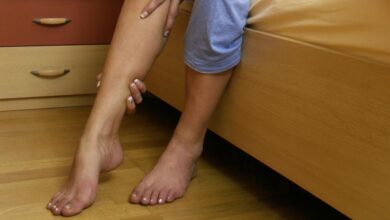
Sleep is vital for maximizing physical talents, but it’s sometimes disregarded when it comes to fitness and sports performance. Your body releases growth hormone when you sleep, which is necessary for the development and repair of muscles. This hormone promotes the growth and development of your muscles by mending tiny tears in them that are caused by exercise. Furthermore, sleep enables your body to manufacture adenosine triphosphate (ATP), which is essential for maximum physical performance and the energy currency of cells.
How Muscle Recovery is Affected by Sleep

A vital component of fitness is muscle healing, and sleep is crucial to this process. Your body releases growth hormone and testosterone when you sleep, which are both necessary for building and repairing muscle. These hormones aid in inflammation reduction, muscle fiber repair, and the production of new proteins. Your muscles will have more time to grow and heal if you get adequate sleep, which will enhance your physical performance.
In addition, a lack of sleep can impede the healing of muscles and raise the possibility of injuries. Increased amounts of cortisol, a stress hormone that can damage muscle tissue and slow down the healing process, can result from sleep deprivation. Additionally, it may hinder your body’s capacity to store glycogen, which serves as your muscles’ main energy source when you exercise. Therefore, a lack of sleep might impair one’s ability to function physically overall, as well as their muscle strength and endurance.
Sleep’s Function in Hormone Regulation
Hormones are essential for controlling a number of body processes, such as energy production, muscle growth, and metabolism. Sleep is crucial for preserving the right hormone balance, and sleep deprivation can upset this delicate balance.
Your body controls the synthesis and release of several hormones, including leptin, insulin, growth hormone, and cortisol, while you sleep. These hormones play a role in energy metabolism, hunger control, muscle regeneration, and general body composition.
The synthesis of these hormones may be impacted by sleep deprivation, which may result in imbalances that impair physical performance.
Sleep deprivation has been linked to diminished growth hormone synthesis, impaired insulin sensitivity, and impaired glucose metabolism, which can all result in decreased muscle growth.
Additionally, it may raise cortisol levels, which may impede recovery and encourage muscle breakdown. Inadequate sleep can also impact the hormone responsible for controlling hunger, leptin, which can result in increased cravings and even weight gain.
Lack of Sleep and Its Effect on Sports Performance

Athletic performance can be significantly impacted by sleep deprivation. Cognitive function, response time, decision-making, and general physical coordination can all be negatively impacted by sleep deprivation.
Research has indicated that insufficient sleep might impair an athlete’s ability to respond quickly and make precise decisions, which are critical abilities for players in sports like basketball, tennis, and soccer.
Lack of sleep can also impair endurance and cardiovascular health. Your heart rate variability, which gauges the autonomic nervous system’s capacity to control heart function, falls when you don’t get enough sleep.
This may result in a decline in cardiovascular capacity and a reduction in physical activity endurance.
Lack of sleep might also make people less motivated to work out. You might feel more exhausted and less motivated to exercise when you don’t get enough sleep.
This may impede your efforts to reach your fitness objectives and increase the difficulty of maintaining a regular workout schedule.
Advice for Increasing the Quality of Your Sleep
Now that we know how crucial sleep is for maintaining optimal physical function, let’s look at some suggestions for raising the quality of our sleep:
Maintain a regular sleep routine. Even on weekends, make an effort to go to bed and wake up at the same time every day. Better sleep quality is encouraged, and your body’s internal clock is regulated as a result.
Establish a sleep-friendly environment by making sure your bedroom is cool, quiet, and dark.
If required, use earplugs, white noise machines, or blackout curtains.
Create a nighttime routine by doing soothing things in advance of going to bed to let your body know when it’s time to sleep.
This can involve deep breathing techniques, meditation, reading a book, or having a warm bath.
Minimize the amount of time you spend on electronics.
The blue light these devices create can disrupt your sleep.
To lessen the damage, avoid using devices at least an hour before going to bed, or wear blue light-blocking glasses or filters.
Avert stimulants right before bed.
Alcohol, nicotine, and caffeine can all interfere with your sleep cycles. Aim to stay away from these things in the evening, especially right before bed.
The Connection Between Energy Levels and Sleep

Energy levels must be restored and replenished, and sleep is essential for this.
Your body replenishes glycogen stores, the main fuel source for muscles during activity and sleep, to preserve and recover energy.
Your body needs enough glycogen to power your exercises and other activities, so getting enough sleep is essential.
Furthermore, sleep aids in controlling the release of chemicals linked to energy, including insulin and cortisol.
Getting enough sleep helps raise insulin sensitivity, which makes it possible for your body to use glucose for energy more effectively.
Additionally, it aids in controlling cortisol levels, which avoids excessive muscular tissue deterioration and supports a condition of balanced energy.
Your energy can decline if you don’t get enough sleep.
Lack of sleep might make you feel more exhausted, less able to exert yourself, and less motivated to exercise.
Additionally, it may interfere with your body’s capacity to control blood sugar levels, which could result in swings and dips in energy levels during the day.
How Sleep Impacts Decision-Making and Cognitive Function
For the brain to function at its best, sleep is necessary for cognitive functions including memory, attention, and decision-making.
Your brain organizes and integrates information while you sleep, which enhances your capacity to pick up and remember new abilities.
Sleep deprivation has been linked to cognitive impairment and difficulty making decisions, according to research.
Reaction times might be slowed down, concentration problems can arise, and attentiveness levels can drop when sleep is deprived.
This can significantly affect sports performance, as quick reflexes and split-second choices are frequently needed.
Lack of sleep can also have an impact on mood and emotional control.
You may get more easily agitated, less motivated, and more stressed out when you don’t get enough sleep.
In order to achieve the best possible physical and mental performance, it is even more important to prioritize sleep because these factors might further impair your cognitive function and decision-making ability.
Athletes’ Sleep and Injury Prevention

Athletes frequently worry about injuries, and getting enough sleep is essential to both preventing and recovering from injuries.
Your body heals injured tissues, lowers inflammation, and fortifies the immune system as you sleep.
Additionally, it aids in controlling pain perception, which enables your body to heal from micro-injuries brought on by exercise.
Athletes who lack sleep may be more prone to injury. Athletes who don’t get enough sleep may experience shorter reaction times, balance issues, and diminished coordination, which increases their risk of falls and accidents. Additionally, it may weaken your immune system, increasing your vulnerability to infections and slowing down the healing process.
Making sleep a priority can lower the chance of injury and hasten recovery.
You may prevent common sporting ailments like muscular imbalances and overuse problems by giving your body ample time to heal and rejuvenate.
Techniques for Improving Sleep Quality for Enhanced Physical Performance
In order to improve your physical performance and sleep quality, think about putting these techniques into practice:
Make getting enough sleep a priority when you train.
Getting enough sleep to maintain your fitness level is crucial. Just as you would with your exercise and diet, set aside enough time and give good sleep a high priority.
Establish a regimen that promotes sleep quality by including calming activities like reading, stretching, or mindfulness exercises before bed.
Your body will receive this routine as a cue to wind down and get ready for sleep. Control your stress levels because they can affect the quality of your sleep.
To help lower stress and encourage better sleep, try stress-reduction strategies like journaling, deep breathing exercises, or meditation.
Make the most of your sleeping environment by making sure your bedroom is comfortable.
Invest in cozy pillows and mattresses, block out light with eye masks or blackout curtains, and control noise levels with earplugs or white noise devices.
Maintain proper sleeping habits.
Steer clear of stimulants and activities right before bed. Avoid overindulging in meals, cut back on coffee, and establish a peaceful, cozy sleeping environment.
Seek advice from a sleep expert if necessary.
After trying these solutions and still having trouble falling asleep, you might want to see a sleep specialist.
They can offer tailored suggestions for enhancing the quality of your sleep or assist in identifying any underlying sleep issues.
In summary, putting sleep first for the best fitness outcomes
In conclusion, there is no denying the link between fitness and sleep.
Enhancing physical performance, muscle healing, hormone management, energy levels, cognitive function, preventing injuries, and general well-being all depend on getting enough sleep.
Make getting enough sleep a priority in order to reach your fitness objectives and realize your full potential.
Put the advice and techniques in this article to use to get the most out of your sleep and experience enhanced physical performance.
Always remember to prioritize getting adequate sleep in the same way that you devote time and energy to your diet and exercise.
You’ll be well on your way to reaching your ideal level of fitness, and your body will appreciate it.
Allow sleep to be your hidden weapon while you pursue fitness, and you’ll see a breakthrough in your performance.
Happy training and sweet dreams!
This blog post examines the relationship between fitness and sleep, emphasizing how crucial restful sleep is to optimal physical performance.
It addresses issues including hormone regulation, energy levels, injury prevention, muscle regeneration after an accident, and sleep.
The article gives ways for optimizing sleep to improve physical performance as well as suggestions for raising the quality of sleep.
In order to achieve the best fitness outcomes, the importance of prioritizing sleep is emphasized in the conclusion.




